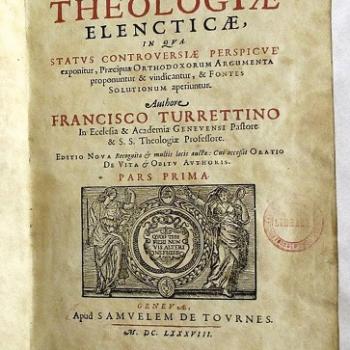
Atheist anti-theist Jonathan M. S. Pearce is the main writer on the blog, A Tippling Philosopher. His “About” page states: “Pearce is a philosopher, author, blogger, public speaker and teacher from Hampshire in the UK. He specialises in philosophy of religion, but likes to turn his hand to science, psychology, politics and anything involved in investigating reality.” His words will be in blue.
*****
I am replying to Jonathan’s paper, “The Double Standards Involved with Doubting Thomas” (3-16-21).
God saw fit to convince Doubting Thomas, who – after all – knew ~Jesus and saw him do his miracles. He was a disciple – one of Jesus’ inner circle. And yet even he didn’t believe in the Resurrection, attested to by his friends and eyewitnesses, until he had Jesus standing in front of him until Jesus made him touch the wounds.
Some people are slow. One can find the entire range of types of people in any group. Thomas is a certain “hard-nosed” type, but he’s not in the same category as most atheists, as I will contend below.
As John 20 relays:
24 But Thomas, one of the twelve, who was called [e]Didymus, was not with them when Jesus came. 25 So the other disciples were saying to him, “We have seen the Lord!” But he said to them, “Unless I see in His hands the imprint of the nails, and put my finger into the place of the nails, and put my hand into His side, I will not believe.”
26 [f]Eight days later His disciples were again inside, and Thomas was with them. Jesus *came, the doors having been [g]shut, and stood in their midst and said, “Peace be to you.” 27 Then He *said to Thomas, “Place your finger here, and see My hands; and take your hand and put it into My side; and do not continue in disbelief, but be a believer.” 28 Thomas answered and said to Him, “My Lord and my God!” 29 Jesus *said to him, “Because you have seen Me, have you now believed? Blessed are they who did not see, and yet believed.”
Did you notice the last verse there? The Thomas incident was not regarded by Jesus as normative, but rather, a special act of mercy that was not “epistemologically required.” Jesus thought it wasn’t necessary, and criticized Thomas at the end for his undue doubt. He did it because He loved Thomas, and we all do many things that aren’t required for our loved ones.
And yet almost the entirety of the rest of humanity is not remotely afforded this level of evidence and is expected to believe, arguably on pain of hell.
Thomas got to poke Jesus, bodily resurrected in front of him, in the hands. He got to feel the skin of the real and resurrected God, and only then did he believe.
He’s now a Saint.
This is completely unfair and terrible double standards.
God is not fair.
Therefore, God is not perfect or omnibenevolent.
It’s only “unfair” and a supposed massive disproof of God’s perfection and benevolence if we accept Jonathan’s prior premises. I do not. Nor does the Bible. I reject three of them (off the top of my head) in particular:
1) The notion that empiricism is the only way to verify or prove anything, as if there are no other ways of knowing.
2) The denial that God is already known by observing the universe, as Romans 1 states.
3) The idea that every atheist would immediately believe (and respond exactly as Thomas did) if only they had the “100% sure!” experience of Thomas: with the risen Jesus standing there, bodily, so that he could touch Him.
Empiricism (#1 above) is not the only way of knowing anything. That is a myth and a fallacy. I’ve written about it many times:
Is Christianity Unfalsifiable? Is Empiricism the Only True Knowledge? [5-6-17]
Science, Logic, & Math Start with Unfalsifiable Axioms [1-6-18]
Seidensticker Folly #13: God Hasta Prove He Exists! [8-29-18]
Theistic Argument from Longing or Beauty, & Einstein [3-27-08; rev. 3-14-19]
Atheist Demands for a Miracle to “Prove” God (Dialogue) [2-22-19]
Atheist Desire for Amazing Divine Miracles / Incorruptibles [2-23-19]
God’s Proof of Himself Via Miracles (vs. an Atheist) [3-6-19]
Dialogue w Agnostic on Proof for Miracles (Lourdes) [9-9-18]
Dialogue with an Agnostic: God as a “Properly Basic Belief” [10-5-15]
Non-Empirical “Basic” Warrant for Theism & Christianity [10-15-15]
Atheist Demands for “Empirical” Proofs of God [10-27-15]
Implicit (Extra-Empirical) Faith, According to John Henry Newman [12-18-15]
The biblical position is the opposite of #2:
Romans 1:19-20 (RSV) For what can be known about God is plain to them, because God has shown it to them. [20] Ever since the creation of the world his invisible nature, namely, his eternal power and deity, has been clearly perceived in the things that have been made. . . .
Now, of course, the atheist says, “who cares about that? It’s just the Bible saying what we would expect it to say; but it’s circular reasoning to cite the Bible to prove the Bible . . .” For my part, I’m not trying to prove the point at the moment, so I’m not engaged in circular reasoning or begging the question. I’m simply reporting (sociologically and theologically) what the Bible teaches
How we would flesh out Romans 1 philosophically would be to utilize the teleological and cosmological arguments. But is it true that a thinking person can simply view the universe and the marvels of science and have a rational basis for thinking that it suggests God or some sort of Higher Power (either personal or impersonal) or “organizing / creative principle” (or whatever way one would like to describe it)? I submit that some very great minds (and not Christian minds) have indeed had that reaction.
Philosopher David Hume was a deist (not an atheist: as is wrongly assumed by many). It is thought that he dismantled the teleological argument. But many good Hume scholars maintain that he disposed of merely one form of it: not all forms. He appears to offer support for my contention, from Romans 1, that the observable world bears witness to God’s existence:
The order of the universe proves an omnipotent mind. (Treatise, 633n)
Wherever I see order, I infer from experience that there, there hath been Design and Contrivance . . . the same principle obliges me to infer an infinitely perfect Architect from the Infinite Art and Contrivance which is displayed in the whole fabric of the universe. (Letters, 25-26)
The whole frame of nature bespeaks an intelligent author; and no rational enquirer can, after serious reflection, suspend his belief a moment with regard to the primary principles of genuine Theism and Religion . . . (Natural History of Religion, 1757, edited by H. E. Root, London: 1956, 21, 26)
As my second corroborating example, I submit Albert Einstein, who was some sort of pantheist (“God is everything”) or panentheist (“God is in everything”) — assuredly not an atheist –, but who backs up to a significant degree, the thought that Paul expresses in Romans 1 and that Christians believe (in faith, but backed up by philosophy). I’ve collected many of his statements concerning religion and the marvels of the universe. Here are several of those (further detailed source information is provided in that paper):
My religiosity consists of a humble admiration of the infinitely superior spirit that reveals itself in the little that we can comprehend about the knowable world. That deeply emotional conviction of the presence of a superior reasoning power, which is revealed in the incomprehensible universe, forms my idea of God. (1927)
I’m not an atheist and I don’t think I can call myself a pantheist. We are in the position of a little child entering a huge library filled with books in many different languages. The child knows someone must have written those books. It does not know how. The child dimly suspects a mysterious order in the arrangement of the books but doesn’t know what it is. That, it seems to me, is the attitude of even the most intelligent human being toward God. We see a universe marvelously arranged and obeying certain laws, but only dimly understand these laws. Our limited minds cannot grasp the mysterious force that moves the constellations. (1930)
Then there are the fanatical atheists whose intolerance is the same as that of the religious fanatics, and it springs from the same source . . . They are creatures who can’t hear the music of the spheres. (1941)
In view of such harmony in the cosmos which I, with my limited human mind, am able to recognize, there are yet people who say there is no God. But what makes me really angry is that they quote me for support of such views. (c. 1941)
As for #3, many atheists — if not necessarily Jonathan — casually assume that pretty much every atheist and skeptic would respond as Thomas did. Jesus thought quite otherwise:
Luke 16:19-31 There was a rich man, who was clothed in purple and fine linen and who feasted sumptuously every day. [20] And at his gate lay a poor man named Laz’arus, full of sores, [21] who desired to be fed with what fell from the rich man’s table; moreover the dogs came and licked his sores. [22] The poor man died and was carried by the angels to Abraham’s bosom. The rich man also died and was buried; [23] and in Hades, being in torment, he lifted up his eyes, and saw Abraham far off and Laz’arus in his bosom. [24] And he called out, `Father Abraham, have mercy upon me, and send Laz’arus to dip the end of his finger in water and cool my tongue; for I am in anguish in this flame.’ [25] But Abraham said, `Son, remember that you in your lifetime received your good things, and Laz’arus in like manner evil things; but now he is comforted here, and you are in anguish. [26] And besides all this, between us and you a great chasm has been fixed, in order that those who would pass from here to you may not be able, and none may cross from there to us.’ [27] And he said, `Then I beg you, father, to send him to my father’s house, [28] for I have five brothers, so that he may warn them, lest they also come into this place of torment.’ [29] But Abraham said, `They have Moses and the prophets; let them hear them.’ [30] And he said, `No, father Abraham; but if some one goes to them from the dead, they will repent.’ [31] He said to him, `If they do not hear Moses and the prophets, neither will they be convinced if some one should rise from the dead.'”
Jonathan, like most atheists, completely overlooks the prideful, stubborn and irrationally defiant aspect of atheism (and indeed of the human race, generally speaking). St. Paul wrote about that, too:
Romans 1:18, 21-25 For the wrath of God is revealed from heaven against all ungodliness and wickedness of men who by their wickedness suppress the truth. . . . [21] for although they knew God they did not honor him as God or give thanks to him, but they became futile in their thinking and their senseless minds were darkened. [22] Claiming to be wise, they became fools, [23] and exchanged the glory of the immortal God for images resembling mortal man or birds or animals or reptiles. [24] Therefore God gave them up in the lusts of their hearts to impurity, to the dishonoring of their bodies among themselves, [25] because they exchanged the truth about God for a lie and worshiped and served the creature rather than the Creator, who is blessed for ever! Amen.
But lest atheists (or anyone) think that therefore no atheist can be saved, this is not Paul’s position, either, as he clarifies in the next chapter:
Romans 2:6-16 For he will render to every man according to his works: [7] to those who by patience in well-doing seek for glory and honor and immortality, he will give eternal life; [8] but for those who are factious and do not obey the truth, but obey wickedness, there will be wrath and fury. [9] There will be tribulation and distress for every human being who does evil, the Jew first and also the Greek, [10] but glory and honor and peace for every one who does good, the Jew first and also the Greek. [11] For God shows no partiality. [12] All who have sinned without the law will also perish without the law, and all who have sinned under the law will be judged by the law. [13] For it is not the hearers of the law who are righteous before God, but the doers of the law who will be justified. [14] When Gentiles who have not the law do by nature what the law requires, they are a law to themselves, even though they do not have the law. [15] They show that what the law requires is written on their hearts, while their conscience also bears witness and their conflicting thoughts accuse or perhaps excuse them [16] on that day when, according to my gospel, God judges the secrets of men by Christ Jesus.
Therefore, an atheist can possibly be saved, and there is a big biblical distinction between the not-convinced seeker after truth and the outright rejecter of God. But they can’t be saved if they know God exists (are conscious of that belief) and reject Him and His free offer of grace and salvation. How much one “knows” is obviously the key. And only God knows that for any given person. It’s not for other persons to judge that or to condemn people to hell. They don’t have nearly even knowledge to make that determination.
Lastly, atheists manage to believe many extraordinary things without much proof (or even understanding) at all. Why should they place the existence of God in a category all its own? For example, I have written about how atheists in effect “worship” the atom (this paper raised such a huge ruckus that I had to do a follow-up paper to explain the nature of the satire), and attribute to it virtually every characteristic that Christians believe God possesses: it supposedly came from nothing (this one not a trait of God), managed to have the inherent capability to evolve and create and bring about everything we see in the universe, including consciousness, life, the galaxies, etc.
These are extraordinary attributes. And why do atheists believe in them? Well, they have few ultimate reasons to explain it, but it’s the only alternative they think they have to admitting that God exists and that He created, designed, and upholds the universe. If you want to reject God: concerning Whom there are many evidences and arguments that have been rationally and seriously discussed for thousands of years, then you go instead to a blind faith position: the atom (and a larger materialism) can do anything: including creating itself from nothing (a self-evidently absurd position that science has long since rejected).
G. K. Chesterton observed”: “if men reject Christianity, it’s not that he believes in nothing, but that he believes in anything.”
***
Related Reading
God the Designer?: Dialogue with an Atheist [8-27-20]
“Quantum Entanglement” & the “Upholding” Power of God [10-20-20]
Seidensticker Folly #71: Spirit-God “Magic”; 68% Dark Energy Isn’t? [2-2-21]
Seidensticker Folly #38: Eternal Universe vs. an Eternal God [4-16-20]
***
Summary: Atheist Jonathan MS Pearce argues that God was unfair, insofar as Jesus extraordinarily proved Himself in person to Doubting Thomas. But three of his prior premises can easily be denied.
***
Photo credit: The Incredulity of Thomas (1622), by Hendrick ter Brugghen (1588-1629) [public domain / Wikimedia Commons]
***













